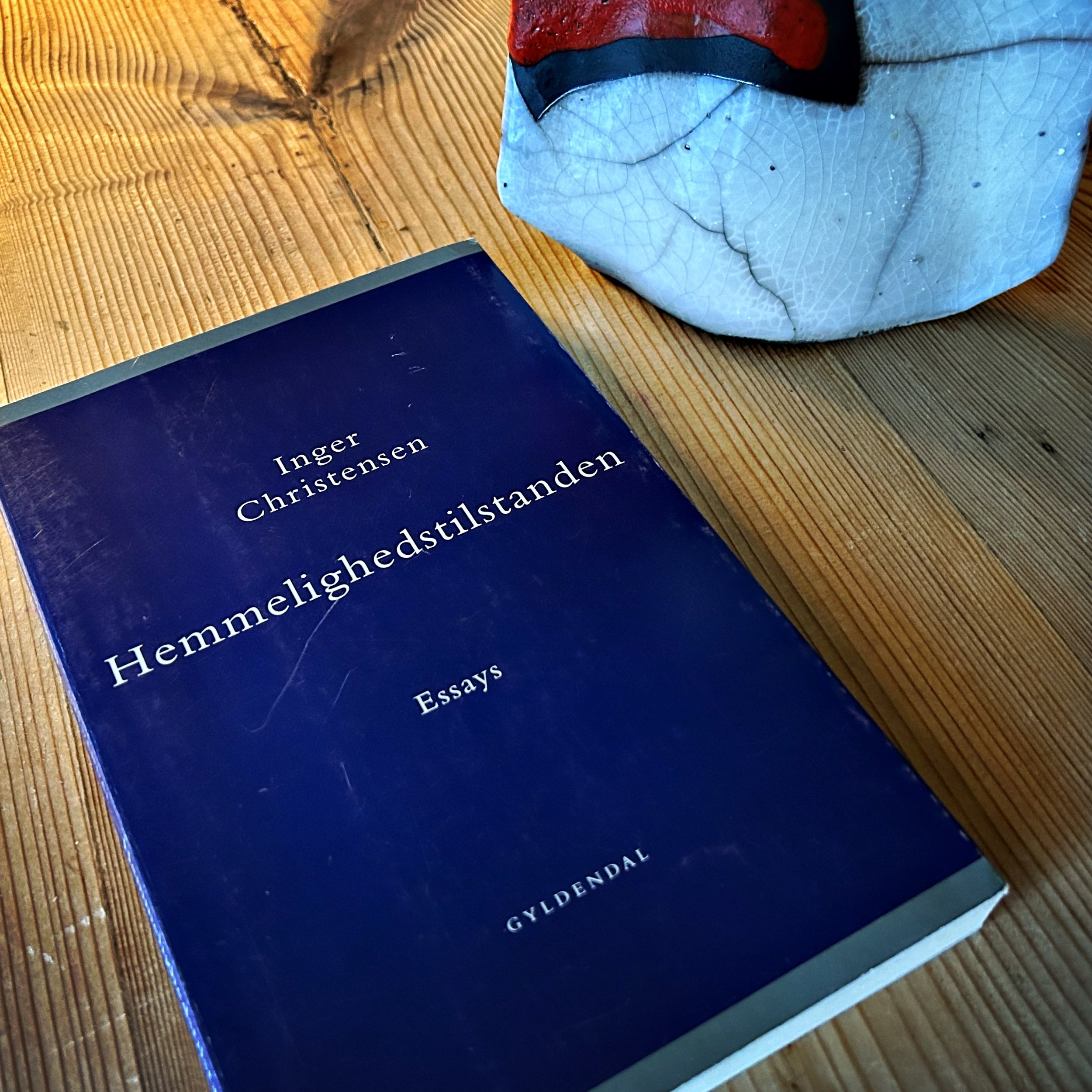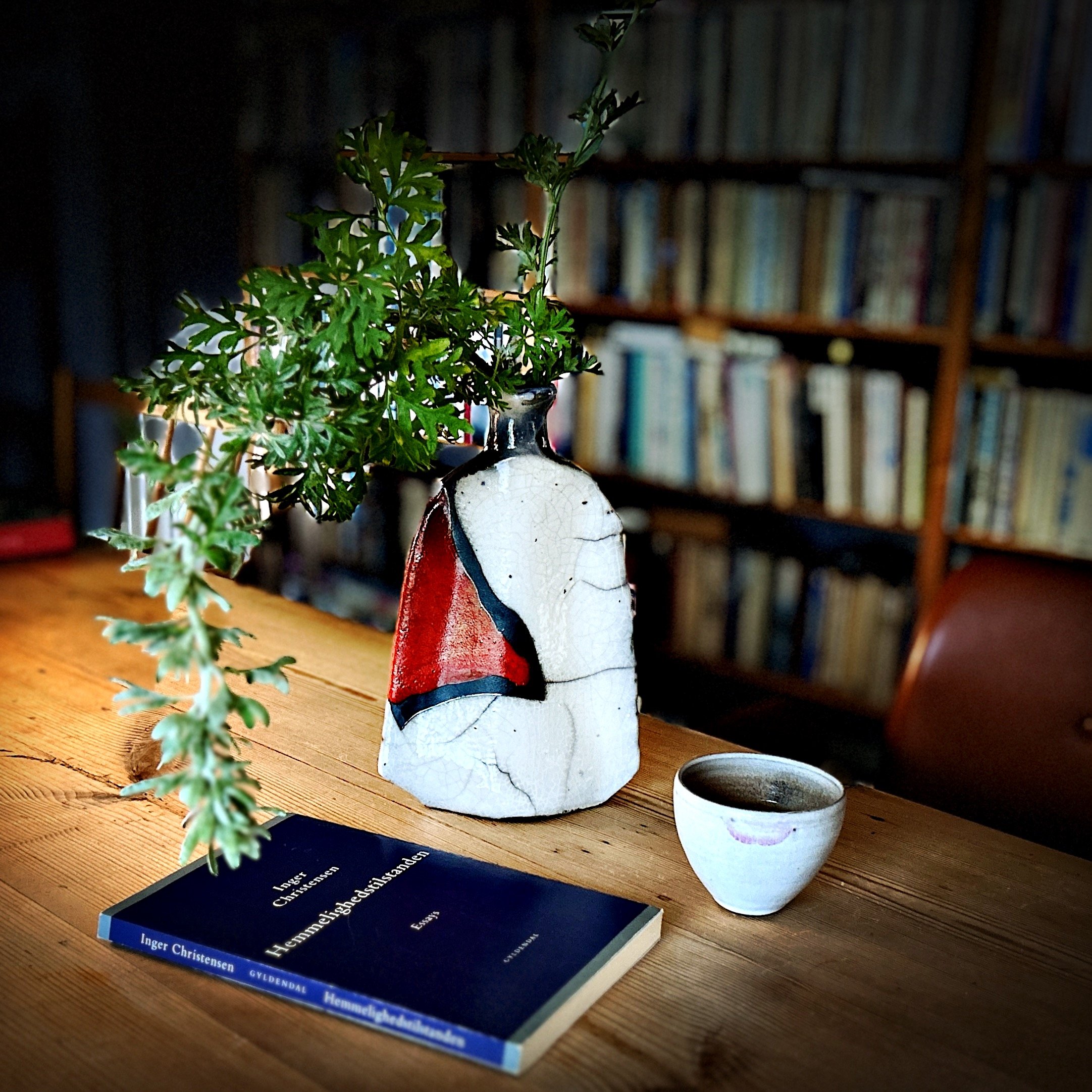The condition of secrecy
The beauty of wormwood in just the vase in fine company, too, in the form of Danish poet Inger Christensen’s book on secrets, The Condition of Secrecy – in the original Hemmelighedstilstanden – brings me back in time to an investigation of what we make of our fortune and the ominous in it.
While looking at the ‘red cape’ surrounding the body of my fine vase, I thought about this secret: nothing is a choice, even when we seem to decide all sorts of things.
While shuffling some cards, all for chance and nothing for choice, I remember the time I spent with Inger at the Sanbjerg castle in Denmark in 2000, listening to her read her poems, incanting, too, to the numen in the omen.
In her eighth essay in the book on ‘chance and its upper hand,’ I get the feeling that we’re in agreement, Inger and I. In this essay, ‘The Regulating Effect of Chance’ – first written in 1994 – she shares what I like to consider is my cartomantic philosophy:
I think we should try to live with a reduction of meaning. To get rid of the idea that there is any meaning beyond what we’ve always been able to recognize, to reflect, and to stimulate – an ability stemming from our existence as precisely that part of meaning that’s able to see its own meaning – no more, no less.
I sink further into her words, while wondering if my vase is being possessed by the scarlet spirit of cardinal Richelieu, the one that got me in trouble when I fell in love with all things cloak and dagger a long time ago.
I look at the creature that first follows the Fool. Then I see it captured as an eagle on the shield that the Empress holds under her arm. This is the woman who has a grasp on what Inger calls ‘the orderly workings of chance.’ But then what happens? The emblem comes to life, and we now see the eagle become a lion, submitting to Milady’s aims. What is this Force trying to do? Get words out of the creature’s mouth? Or is that a question for The Three Musketeers?
Inger was great with questions. I wish she would pose some to me, because then I'd know how to answer what I would also like to know per chance.
But I have the cards to look at, if I insist on a question. Observing closely, I note that the cards here seem to speak of the theme of arrival, a theme that the Condition of Secrecy also explores: is the Fool arriving to a state of power? Or is it chance itself that does it?
We can only force so much meaning out of a string of cards. What yields a state of sovereignty in working with chance, or the nature of divination, is not an aimless wandering through deserts with 22, 36, 54 or 78 emblematic cards in our pocket that we cast according to a randomly formulated method. Sovereignty in divination is achieved through ‘the orderly workings of chance’ against the aim to make everything easy, relatable, and accessible.
Any oracle with respect for itself will not perform the function of an arrow of urgency: ‘the public toilet is this way.’ It will make the complex difficult to tame as a matter of necessity, for what use is an answer that does not roar?
I think I just got to my question, so I’ll stop here, but not before I say this: read for the difficult and wrestle with its power. You might end up with poetry or the kind of answer that can address your humanity in particular and exquisite ways. You’d even be equipped to say yes, if, per chance, a cardinal invited you to dinner, and then made you an offer you would not be able to refuse: ‘take this carte blanche and do what you must…’
*
Chance choices
I could say that all my works are about chance and choice and the difficult position we’re in when we forget which one is the most real. More explicitly, there’s my book on Choice & then there’s Tarot for Romeo and Juliet, the most cloak and dagger thing you’ll ever encounter.







